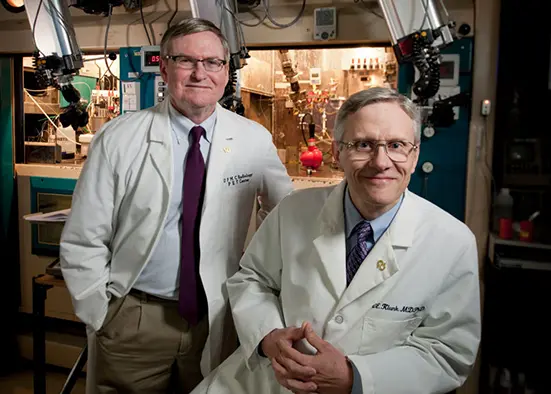
Grants support best-of-field scientific investigations, enabling groundbreaking discoveries and building a pipeline of projects eligible for federal research funding.
Alzheimer's Association International Research Grant Program (IRGP)

Chester Mathis, Ph.D., and William Klunk, M.D., Ph.D., used an IRGP grant to develop the first-ever amyloid PET tracer.
The nonprofit with the highest impact in Alzheimer’s disease research worldwide, the Alzheimer’s Association has helped catalyze nearly every major advancement in dementia science. These have included development of the leading theories of the cause of Alzheimer’s-related brain cell degeneration and the first radiotracer (PiB) capable of showing amyloid deposits in the living brain via a PET scan, among many others. We have also nurtured exponential growth in the number of scientists who are devoting their career to dementia research.
Our international panel of experts identifies the most promising research across the globe. To ensure only best-in-field investigations are funded, we call on our network of 6,000 scientists around the world to perform a rigorous two-tier review of grant applications. Our funding increases every year and includes support for:
- Research studies in four key focus areas. We invest in Molecular Pathogenesis and Physiology; Diagnosis, Assessment and Disease Monitoring; Translational Research and Clinical Interventions; and Dementia Care and Impact of Disease, including Population Studies.
- Special grant initiatives. For example, we are funding a clinical trial of a "drug cocktail" to treat Alzheimer’s through the Alzheimer’s Combination Therapy Opportunities (ACTO) initiative and studies of the role of sex and gender in Alzheimer's through the Women’s Alzheimer's Research Initiative (WARI).
- Researchers at every career stage. Our grants support laboratory and clinical scientists at all levels affiliated with universities, research institutes and industry. Because history shows that groundbreaking ideas are almost always conceived early in a scientist’s career, we have a long-standing and growing commitment to funding researchers when they are just starting in the field.
There has never been a more opportune time to feed the dementia research pipeline. Thanks largely to the Association’s advocacy efforts, the National Institutes of Health (NIH) annual budget for research on Alzheimer’s and other dementia has increased more than six-fold since 2011. The Alzheimer’s Association and the NIH play complementary roles in advancing critical science: We provide seed funding that enables scientists to test hypotheses and generate the data they need to scale their work with larger funding from the NIH. The dramatic expansion in federal funding requires an equally dramatic increase in projects to feed the pipeline.
This Project Advances:
Discovery Science
Early Detection
Treatment
Prevention
